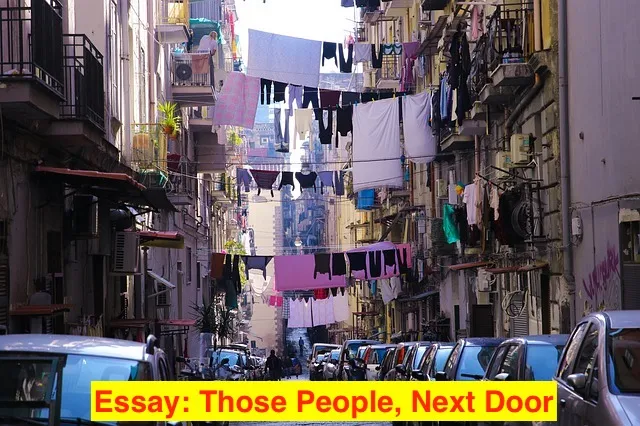Essay: Those People, Next Door
Outline: People in cities do not know their neighbours - villagers known all about their neighbours - we tend to think ill of our neighbours - we must remember that we ourselves are neighbours to others.
We who live in the cities all have neighbours, and for the most part 'thin partitions do our realms divide'. It is true that, however thin the walls, we seldom know our neighbours. If the man who has lived next door to me in a suburb of Mumbai for the last half - dozen years came and sat down beside me in a restaurant, I should not, as the saying is, know him from Adam. In this vast whirlpool of Mumbai he goes his way and I mine, and our paths are not likely to cross though we go on living beside each other.
I do not know whether he is short or tall, old or young, or anything about him, and I am sure he is in the same state of contented ignorance about me. Our intercourse is limited to the noises we make with the piano, the radio, the television and so on. When he has friends to visit him we learn something about him from the sounds they make, the music they play, and the time they go away (often inexcusable late). But apart from that vague intimation, my neighbor might be living on Mars or on the moon. Perhaps some day his house (or mine) will be on fire, and then I dare say we shall become acquainted. But apart from such catastrophe as this there seems no reason why we should ever exchange a word on this side of the grave.
It is not pride or incivility on either side that keeps us remote from each other. It is simply our way of living in a metropolis. People are so plentiful that they lose their identity. In villages and small towns a person knows all about his neighbour, his affairs, his family, his calling, and his habits. Neighbours commonly borrow from one another all sorts of things they need - newspapers, sugar, milk and so forth. This is not always so desirable as it seems. Village life can be poisoned by neighbours until the victim pines for the solitude of a city street, where neighbours are so plentiful that you are no more conscious of their individual existence than if they were blackberries on a hedgerow.
On the occasions when we become acutely conscious of our neighbours, the temptation is to think ill of them. They always manage to be gay when you are sleepy. If they are not guilty of criminal waste, they can be convicted of shabby parsimony. They either dress too luxuriously or do not dress luxuriously enough for the decencies of the neighbourhood. Their habits and their friends, the music they play, the pets that they keep, the newspapers they read - all these things confirm our darkest fears. It is possible to believe anything about them - especially the worst. What are those sudden shrieks and gusts of laughter? Is there not an alcoholic suggestion about such undisciplined hilarity?
The truth is that we know too much about our neighbours, and do not know enough. They are revealed to us in fragments, and in putting the fragments together we do not spare them. There is nothing so misleading as half-heard and half-understood scraps. The curious thing about those people next door is that, if you ever come to know them, you find they are not a bit like what you thought they were. You find to your astonishment that they have redeeming features. Perhaps they find that we have redeeming features, too. For the chastening truth is that we all play the role of those people next door to somebody. We are all being judged, and generally very unfavourable judged, on evidence which, if we knew it, would greatly astonish us. It might help us to be a little more charitable about those people next door if we occasionally remembered that we are those people next door ourselves.
Difficult words: Know him from adam - recognize or identify him. catastrophe - calamity, pine for - long for. parsimony - miserliness. hilarity - merriment. fragments - pieces chastening - which corrects us by punishing or humbling us.

